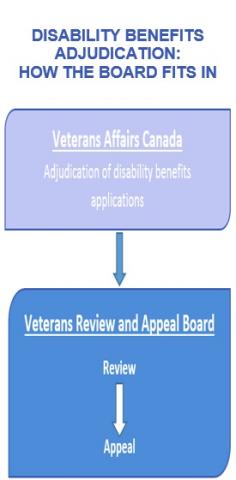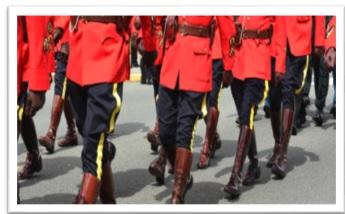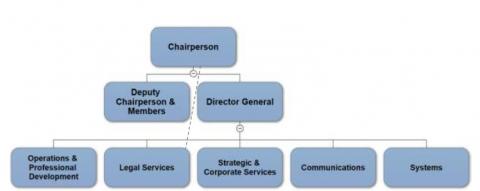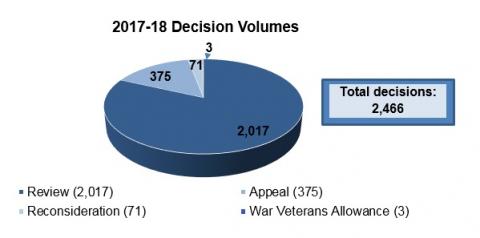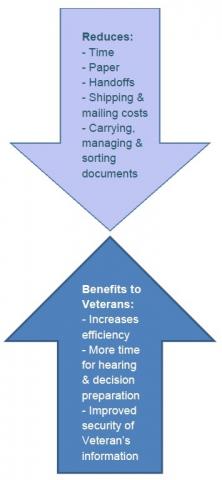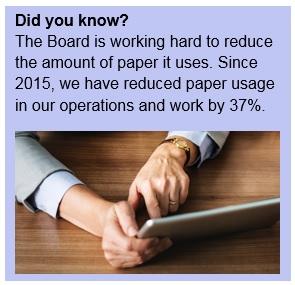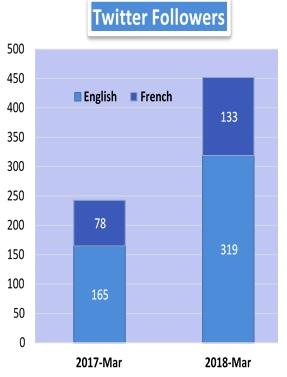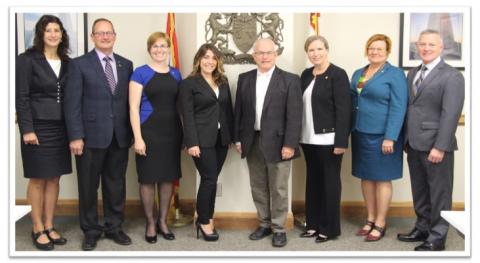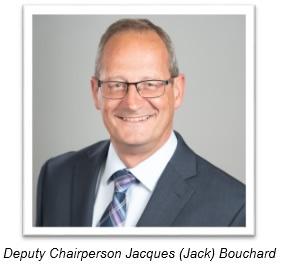
ISSN 2368-027X
Table of Contents
Chairperson's Message
This Annual Report details the Veterans Review and Appeal Board’s work in 2017-18 to deliver a national appeal program for Veterans’ disability benefits decisions made by Veterans Affairs Canada.
As usual, the most important accomplishment of our year was to conduct respectful hearings and make fair decisions for Veterans, Canadian Armed Forces (CAF) and Royal Canadian Mounted Police (RCMP) members, and their families.
Last year, the Board heard 2,017 Reviews and 375 Appeals for applicants across the country. As a result, more than 40% of them received increased benefits for service-related disabilities from the Board.
Our Board underwent several changes throughout 2017-18 including a reorganization of our operations as well as a change in leadership.
Reorganizing the Board’s operations was necessary to improve service to Veterans. Among other things, we have reduced hand-offs, paper usage and mailing costs to increase efficiency and quality. We are already beginning to see the positive effects and will look back a year from now to measure progress for Veterans.
I was appointed as Chairperson and Jacques (Jack) Bouchard was appointed as Deputy Chair in July 2018. We are both humbled and grateful for this opportunity, and look forward to working collaboratively with stakeholders in the best interests of Canada’s Veterans.
Moving forward, we will be placing a renewed focus on stakeholder engagement. We look forward to meeting with all those who give their time to improve the lives of Veterans, and building trust at the ground level. We will also work to ensure that our daily efforts are resulting in a more effective hearing process and an improved quality of decision for the Veteran.
I want to thank all Board staff and Members who worked hard over the past year to support our reorganization and serve Veterans and their families. In particular, we would like to thank former Chair Thomas Jarmyn for his years of leadership at the Board.
I look forward to my term as the Board’s Chairperson in which I will dedicate my time to ensuring Canada’s Veterans get the benefits they are entitled to.
Chris McNeil
Chairperson
1. Who We Are and What We Do
WHAT WE DO FOR VETERANS
The Board ensures that Canada’s Veterans receive the disability benefits to which they are entitled. To do this, the Board offers two levels of redress for disability benefits decisions: a Review hearing and a subsequent Appeal hearing.
Additionally, Veterans can apply for a Compassionate Award outside the usual appeal process. The Board also provides the final level of appeal for War Veterans Allowance decisions. Visit our website to learn more about the appeal options offered through the Board.
AN INDEPENDENT APPEAL PROCESS
The Board operates at arm’s length from the Department to provide a fair and independent appeal process. This means that the Board is an entirely separate organization. As independent decision-makers, Board Members are not bound by previous decisions. They consider every matter before them with a fresh perspective to ensure Veterans are given the best possible review of their decision.
VISION, MISSION, VALUES
The Board’s Vision, Mission, and Values express our commitment to serving Veterans and their families. These statements inform our work and guide all employees.
|
Vision Mission Values Independence: We provide Veterans with hearings and decisions that are free from outside influences. Impartiality: We treat Veterans in a fair and unbiased manner. Respect: We treat Veterans, and one another, with courtesy and respect. Excellence: We strive to serve Veterans better through continuous improvement and innovation. Integrity: We enhance public confidence and trust in the appeal process by being professional and ethical. Accountability: We are open and transparent, so that Veterans and Canadians can hold us accountable for our actions and decisions. |
OUR CONTEXT
The Board’s work is governed by the:
It is important to note that section 3 of the VRAB Act requires the Board to liberally construe and interpret the legislation to fulfill the recognized obligation of the people and Government of Canada to those who have served their country so well, as well as their dependents.
As noted in section 40 of the VRAB Act, the Board is committed to being as informal and expeditious as possible in providing Veterans with a fair appeal process.
OUR ORGANIZATION
Text Version
Our Organization
The graphic describes VRAB's organizational structure.
The top line of the organizational structure graphic contains the Chairperson position. Solid lines are drawn from the Chairperson position to the Deputy Chairperson and members' positions and to the Director General position.
A dotted line leads from the Chairperson position to Legal Services unit.
Solid lines are drawn from the Director General position to Operations and Professional Development, Legal Services, Strategic and Corporate Services, Communications and Systems Units.
The Board is a micro-organization with a small, dedicated staff. The Chairperson, appointed by the Governor in Council, is the Board’s Chief Executive Officer and reports to Parliament through the Minister of Veterans Affairs.
The Board can have up to 25 full-time Members (including the Chairperson and Deputy Chairperson). Members hear Veterans’ cases brought forward for redress. They then decide whether the evidence meets the requirements of the legislation to award new or increased levels of disability benefits.
The Director General provides strategic leadership for the effective planning and management of Board operations and corporate management functions. The Board employs approximately 75 public servants to support the delivery of its program.
Did you know?Free RepresentationVeterans who are not satisfied with a VAC decision have access to free advice and representation from external organizations with expertise in Veterans’ disability benefits. The Bureau of Pensions Advocates (a free legal service provided by the Government of Canada) represents the vast majority of Veterans at Board hearings. Service Officers from Veterans’ organizations represent some Veterans, while a small number of Veterans choose to represent themselves or hire a private representative at their own expense. |
2. The Board's Program
REVIEW HEARINGS
Review hearings are conducted by panels of two Board Members in locations across the country. One of the most important aspects of a Review Hearing is that Veterans have the opportunity to appear before decision-makers and tell their story in their own words. They can bring witnesses and have evidence and arguments presented by their representative. Veterans have access to free legal counsel through the Bureau of Pensions Advocates (BPA) and are reimbursed for their travel costs to attend their hearings. Some Veterans organizations, such as the Royal Canadian Legion, also provide free representation.
The Board’s process is non-adversarial, which means no one is arguing against the Veteran or defending the VAC decision under review.
Hearings are open to the public, except in special circumstances where the Veteran requests and is granted a closed hearing (subsection 36(2), VRAB Act). We encourage members of the public to attend hearings, as this contributes to a greater understanding of the Board’s decision-making. Anyone interested in observing hearings should consult our hearing calendar.
APPEAL HEARINGS
If a Veteran is not satisfied with their Review decision, they can request an Appeal hearing which is the second and final level of redress.
Appeal hearings are conducted primarily in Charlottetown, Prince Edward Island by panels of three Board Members who did not hear the same case at Review. While the legislation does not permit oral testimony at this level, the Appeal hearing provides a further opportunity for a Veteran, through their representative, to submit new information and make arguments in support of their case. Appeal decisions are final and binding.
MORE OPPORTUNITIES FOR VETERANS
Veterans who are not satisfied with their final-and-binding Appeal decision can apply to the Board for a Reconsideration (i.e. a reopening of the case). A Veteran can seek a reconsideration on the basis of new evidence or that the Board has made an error in fact or law.
If a Veteran has exhausted all redress options at the Board and is still not satisfied, they have the right to apply to the Federal Court of Canada for a judicial review of the decision.
3. Caseload
INCOMING CASES
A good indicator of how many applications the Board is likely to receive in a given year, is the volume of VAC’s disability benefits decisions from the previous year. As the table to the right shows, in the last five years, our Review decisions have represented between 5.5% and 9.1% of VAC decisions with appeal rights to the Board from the previous year.
Even though our caseload is primarily correlated with VAC decision volumes, it can fluctuate from year to year due to other factors. One factor is that there is no time limit to bring forward an appeal, i.e. Veterans can request an independent review of their VAC or VRAB decision at any time.
In 2017-18, applicants to the Board were:
- 88% still-serving & retired CAF members
- 10% RCMP
- 2% traditional Veterans
| Fiscal Year |
VAC decisions* |
VRAB Review decisions |
As a % of VAC's previous year decisions |
|---|---|---|---|
| 2017-18 | 35,949 | 2,017 | 5.5% |
| 2016-17 | 36,502 | 2,219 | 6.0% |
| 2015-16 | 37,004 | 2,507 | 8.5% |
| 2014-15 | 29,480 | 2,729 | 8.3% |
| 2013-14 | 32,963 | 3,213 | 9.1% |
*VAC decisions with appeal rights to VRAB, i.e. first applications, medical reassessments, and departmental reviews.
|
Did you know? We hold Review Hearings for Veterans across Canada in the following cities: |
WORKLOAD STATISTICS
|
IN 2017-18, 44% OF REVIEW DECISIONS AND 29% OF APPEAL DECISIONS RESULTED IN THE VETERAN RECEIVING MORE BENEFITS |
|
The Board hears more cases about lower back conditions than any other disability. Other common medical conditions include tinnitus, hearing loss, PTSD, knee and neck conditions. |
TimelinessThe Board strives to provide Veterans with timely service. We have demonstrated our commitment to timeliness by establishing service goals for the time within our control, and meeting them for the vast majority of cases. 16 WeeksWhen a Veteran decides to appeal their departmental decision or a VRAB review decision, they contact the Bureau of Pensions Advocates or another representative organization. The representative works with the Veteran to prepare the case, taking the time they need to obtain additional information and evidence. Once the representative and Veteran advise the Board that they are ready to proceed, our goal is to schedule a hearing, conduct the hearing, and issue the decision within 16 weeks. Last year, we achieved this in 95% of Review and 97% of Appeal cases. Also noteworthy is that the majority of cases (87% of Reviews and 83% of Appeals) were actually heard and decided within a shorter time—just 12 weeks. Timely DecisionsThe 16-week service commitment includes the time it takes for the Board to issue a decision. The Board’s commitment is to issue 80% of decisions within six weeks of the hearing. As we expected, the reorganization of our operations (which required staff to learn new roles and business processes) affected our performance in the short term, with 61% of decisions issued within this timeframe. As we move into 2018-19, we are confident that we will improve timeliness and restore our strong performance in this area. |
NATURE OF APPLICATIONS AND DECISIONS
In general, the Board receives two kinds of applications:
- those for entitlement to benefits based on the relationship between the disability and service; and
- those related to the level of assessment based on the extent or severity of the disability.
In 2017-18, entitlement cases made up 70% of our work, and assessment cases 30%.
The Board heard fewer Appeals in 2017-18, focusing on Reviews from April through September to make the best use of available Members. We resumed our full schedule in the fall after the appointment of new Members in June 2017.
The most common reason for Members to rule favourably is new testimony and/or new medical evidence. In addition, Members rule favourably based on the available evidence, new documentary evidence, changes in policy/law, or errors in the previous decision.
The Board shares its reasons for awarding with VAC to support the department’s efforts to identify trends and opportunities for improvements.
Over the last five years, VAC’s favourability rate has increased significantly, from 71% on first application in 2013-14 to 84% in 2017-18. In other words, more Veterans have been receiving positive outcomes earlier in the process (i.e. at VAC), and no longer need to seek redress at the Board.
This means that the cases that are appealed to the Board are ever-changing and continue to evolve.
For Veterans’ hearings, the Board puts significant effort and time into providing quality documentation. Our goal is to ensure that applicants have the best opportunity for a successful outcome.
We obtain relevant records—Veterans’ medical and service records—either from VAC or, increasingly from National Defence (if not previously requested by VAC). Once the Statement of Case is ready, we make it available to the representative, and also to the Veteran through My VAC Account. The representative lets us know when they are ready to proceed to a hearing.
EVOLVING DEMAND FOR HEARINGS
Every year, the demand for hearings declines in some locations and increases in others. In 2017-18, the Board continued to work closely with representative organizations to determine where and how often to convene hearings based on the demand from Veterans and other applicants.
Written Decisions with ReasonsAfter a hearing, Board Members discuss the information and arguments of the case to make a decision. They conduct a thoughtful analysis of all available information (i.e. oral testimony, medical reports, opinion evidence from experts, written statements, etc.) and discuss the merits of the case, bearing in mind the requirement to resolve any doubt in the weighing of evidence in favour of the Veteran. At Review, if the two panel members disagree, the decision most favourable to the Veteran stands; at Appeal, the decision of the majority of the three panel members stands. The Board is required by law to prepare written reasons to inform Veterans of how and why the decision has been made. |
4. Year in Review
OPERATIONS
Improving Service to Veterans through Reorganization
In 2017-18, the Board embarked on a major reorganization of its operations.
The goal was to review our operations and make changes that would improve service to Veterans. A reorganization was also necessary to support the transition to a paperless process, which has significantly changed how we do our work.
A great deal of time and energy went into the new design of our operations, with many staff taking on different roles and responsibilities. Our work is now divided between pre- and post-hearing activities, and is guided by the principle that work will be done from start to finish by one person/unit.
This will reduce duplication of work and hand-offs, which minimizes the risk of errors and builds in time for the preparation of quality Statements of Case and decisions.
Our priority is to ensure that the changes being made will have a positive impact on Veterans. Our implementation plan is focused on supporting employees through change with clear business processes, communications and training. As we expected, the transition to a new organizational structure took time but we are confident that the changes will improve timeliness and quality for Veterans in the long term.
Reorganization Achievements
Strategic Plan 2016-2021
In May 2016, the Board released an updated strategic plan to guide its work for Veterans and their families over the next five years. The plan highlights how we will modernize our program by improving our systems and streamlining our processes to serve Veterans better. It describes how our work is evolving and what we are doing to support our Members and staff through change.
Here is a snapshot of our progress in 2017-18 towards our three strategic priorities.
Excellence in Service Delivery
- Implemented an electronic signature process for decisions to improve timeliness
- Made plain language a priority for communications and decisions
High-Performing Organization
- Reorganized internal processes to improve service delivery
- Updated the Board’s Integrated Business Plan to align human resources with priorities
- Improved management of performance agreements and assessments for all staff
- Provided continuous learning opportunities for staff
- Supported employees through workshops and activities focused on mental health
Transparency and Accountability
- Published materials, including the Review hearing calendar, on our website
- Continued to post all Board decisions on the Canadian Legal Information Institute’s website
- Distributed more than 6,000 brochures to interested parties across the country
PUBLISHING DECISIONS
As a quasi-judicial tribunal, the Board is bound by the open court principle, which assumes that public confidence in—and understanding of—decision-making requires openness and transparency.
Publishing decisions is important because it allows Veterans to see how the Board applies the law in cases similar to their own, and shows Canadians that the Board is fulfilling its obligations. In short, publishing decisions increases transparency and confidence in the appeal process.
In 2015, the Board began having its decisions published on the Canadian Legal Information Institute (CanLII) website, a well-known legal resource that organizes decisions by year and is searchable by key word. The Board continued this work in 2017-18, sending all decisions to CanLII and promoting this invaluable resource to stakeholders. By March 31, 2018, approximately 12,000 decisions were available there.
In keeping with best practices, the Board depersonalizes decisions before publishing them.
DECISION-MAKING
The Board is required to provide written reasons for its decisions so that Veterans know how and why the decision has been made.
The following decisions illustrate some of the varied cases that come before the Board.
Increased assessment in widow’s case
In this case (100002898945), a widow was seeking an increased level of assessment for her late husband’s pensioned cervical disc disease. Her representative argued that the previous assessment had not recognized the Veteran's radicular symptoms causing daily pain nor the impact of his poor mobility, back and neck pain, and risk of falling on his quality of life. Based on the whole of the evidence, including the Veteran’s statements about his quality of life, the Board was able to increase the overall assessment to 20% from 10%.
Connection to service
In this case (100003324213), the Veteran applied for a reconsideration of his Appeal decision that denied pension entitlement for a Fracture C-5 Vertebrae with Partial Quadriplegia. He had injured his cervical spine in 1970 in a swimming/diving accident while off-duty, which his advocate argued was an activity performed in the best interest of the RCMP from a physical fitness perspective and related to its lifesaving duties in the seaside national park. The Board agreed to reopen the Appeal decision based on errors in law and new evidence, and found enough evidence to reasonably infer a causal relationship between RCMP service and the Veteran’s swimming activity. It granted full entitlement for the claimed condition.
Entitlement awarded based on credible new evidence
In this case, (100002987518), a Veteran asked the Board to review the departmental decision denying him benefits for meralgia paresthetica (a condition causing numbness in the outer thigh). The Veteran testified that while carrying military equipment during a night reconnaissance exercise, he injured his leg after it fell continuously through a hardened crust of snow. The Board awarded full entitlement based on new evidence, including the Veteran’s credible testimony and a new medical opinion from an expert that provided a compelling analysis of the incident and how it resulted in the condition.
BOARD MEMBERS
Member Selection Process
Board Members are appointed by the Governor in Council (GIC) on recommendation from the Minister of Veterans Affairs.
In 2017-18, the Board welcomed the appointment of seven new and six returning Members as a result of the open and transparent merit-based selection process posted on the GIC website the previous year. These appointments included seven CAF and RCMP Veterans as well as seven women. An anticipatory Member selection process was also conducted during the year to identify qualified candidates to fill future vacancies at the Board. In the fall of 2017, the Senior Personnel Secretariat in the Privy Council Office launched a process to invite applications from interested Canadians for the Chair and Deputy Chair positions on the Board, resulting in new leadership.
Oath of Office
In 2017-18, the Board updated its oath of office for new Members. This oath expresses their commitments to Veterans.
|
|
Member Training Topics in 2017-18
Continuous training for our Members is extremely important. Some of the things we worked on this year include procedural fairness, balancing empathy and assertion, online dispute resolution and promotion neutrality in an Integrated Regulatory Model.
We heard from experts on the subjects of plain language writing, as well as moral injury and PTSD.
We also held several internal sessions on the credibility of evidence and testimony, reconsiderations, PTSD assessments, findings and reasons of decisions, Federal Court jurisprudence, and entitlement eligibility guidelines for cervical spine injuries.
COMMUNICATIONS AND OUTREACH
The Board continued to make timely, accurate, and clear communications about its program a priority in 2017-18.
Outreach with Serving Personnel
The Board continued to engage with senior military leaders about what the Board has to offer Veterans. In September, we were pleased to brief Rear-Admiral John F. Newton at the beginning of his one-year assignment with VAC. Later in the year, we hosted Major Alex Braden, new Staff Officer to the Minister of Veterans Affairs, for orientation and a tour of our operations. At these meetings, we underlined how important it is for serving personnel to document events in service and seek treatment for injuries. The Board also improved its presence at the CAF’s Second Career Assistant Network seminars with an updated informational video and brochure. These materials help us to inform releasing members about their appeal rights and to explain the hearing process.
Outreach with Veterans
The Board also worked with Veterans’ organizations to broaden its outreach in 2017-18. We continued to share information through written updates and in person, including orientation for new Legion Command Service Officers and printed materials for the RCMP Veterans’ Association AGM in Charlottetown. In January, our staff honoured Veterans in long-term care facilities by creating more than 75 Valentine’s Day cards as part of VAC’s Valentines for Vets.
Outreach with Parliamentarians
The Board recognizes the importance of engaging with this key audience: we want Parliamentarians to know and understand our program so that they can help inform their constituents. In 2017-18, we provided an information briefing to Member of Parliament Gord Johns, the new NDP Veterans Affairs Critic. We also welcomed the Honourable Seamus O’Regan, the new Minister of Veterans Affairs and Associate Minister of National Defence, to the portfolio.
Outreach Tools
Since the Board launched its official Twitter accounts in 2015, we have been working to grow our audiences by using hashtags, following other accounts and encouraging others to follow us. While we recognize that only a small percentage of Veterans come forward to the Board, our goal is to ensure that all Veterans know about their appeal rights. In 2017-18, we saw significant growth in both our English and French accounts.
- @VRAB_Canada has seen a 93.3% increase in Followers in the past year (March 2017-March 2018).
- @TACRA_Canada has seen a 70.5% increase in Followers in the past year (March 2017-March 2018).
Plain Language Priority
We continued to make plain language writing a priority, so that our decisions and communications are clear and easy to understand. In 2017-18, we developed and delivered in-house training for new members and staff and launched a monthly email campaign with tips and tricks for plain language writing.
FEEDBACK
In 2013, the Board established an exit survey to gather feedback on the Review hearing experience. We did this because we wanted to know how Veterans felt about their hearings, whether we were fulfilling our commitment to provide a respectful hearing experience, and whether there was anything we could do to improve hearings for Veterans. The exit survey is completed by email or telephone after the hearing but before the decision is issued, and is completely anonymous.
Over the last five years, approximately half of all Veterans who had a Review hearing completed our exit survey, providing us with a great deal of useful information. This year we received feedback from 951 individuals. In 2017-18, as in the three preceding years, the vast majority of them indicated that they had a good experience at their hearing.
Veterans also provide us with many positive comments as well as instructive feedback about how we could do better. The Board uses this feedback in Member training and to inform communications products with the goal of improving the hearing experience for Veterans.
Results of our 2017-18 Review Hearing Exit Survey:
|
New Board Members participate in their swearing-in ceremony on October 6, 2017, in Charlottetown, PE.
5. Looking Ahead
MEET OUR NEW LEADERSHIP
The Board is pleased to introduce our new Chairperson Chris McNeil and Deputy Chairperson Jacques (Jack) Bouchard who were appointed by the Minister of Veterans Affairs and Associate Minister of National Defence, the Honourable Seamus O’Regan, in July 2018.
Mr. McNeil, of Dartmouth, Nova Scotia, was first appointed to the Board as a Member in 2015 after retiring as Deputy Chief of the Halifax Regional Police. Mr. McNeil has more than 30 years with the police force.
Mr. Bouchard, of Mermaid, Prince Edward Island, is a Veteran who was first appointed to the Board in 2017 following 36 years with the Canadian Armed Forces.
Their past experience and time as Board Members will serve them well as they embrace their new roles. They are looking forward to working collaboratively with stakeholders in the best interest of Veterans.
Mr. McNeil and Mr. Bouchard will be working as a team in their leadership roles at the Board. Their priority moving forward is to ensure that Canada’s Veterans, CAF and RCMP members, and their families, receive timely service, fair hearings, and all their disability entitlements.
"The appointments of these remarkably accomplished Canadians demonstrate diversity that reflects Canadian values. By accepting these appointments, they have committed to provide Veterans and their families with a fair, respectful and equitable appeal process for disability benefits."
- Honourable Seamus O'Regan
Contact Us
If you have any questions about the Board's work or would like more information about our program, please contact us:
- Email:
- vrab.info@canada.ca
- Telephone:
Toll Free in Canada and the United States - 1-800-450-8006 (English)
- 1-877-368-0859 (French)
- Telephone:
From all other locations, call collect - 0-902-566-8751 (English)
- 0-902-566-8835 (French)
- Mailing Address:
-
Veterans Review and Appeal Board
Post Office Box 9900
Charlottetown PE C1A 8V7 - Fax:
- 1-855-850-4644
- Website:
- www.vrab-tacra.gc.ca
- Twitter:
- @VRAB_Canada
- @TACRA_Canada

